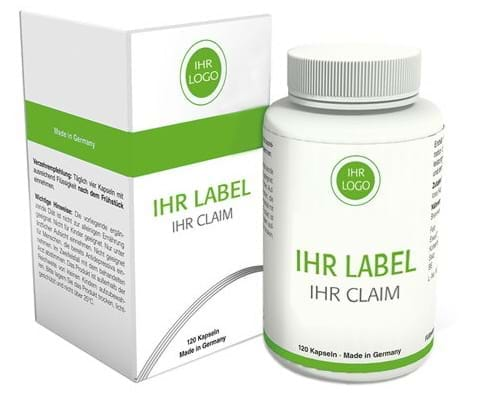Essential oils and plant juice products as a private Label
Product development, contract manufacturing, private label
In addition to well-known liquid foods and food supplements, we now also offer you a large selection of natural, high-quality essential oils as a private label. We also develop customer-specific compositions for you, entirely in line with your needs, via contract manufacturing and fill dropper bottles or other types of packaging materials as required, thereby covering all your packaging needs.
Even the ancient Egyptians were familiar with distillation methods and used essential oils. Of course, the Greeks were also acquainted with the art of distillation; some distillation processes are even documented in ancient scripture. And evidence also indicates that the Romans enjoyed the scent from essential oils from very early on.
Today, essential oils are used for many different reasons, e.g. for fragrance diffusion in rooms, as perfumes, for application on the skin or for internal health-related uses. The essential oils won from different plants are characterised by different compositions. These, therefore, have a variety of health effects and are used in different ways.

“Essential oils” info brochure
(German language)
You can find this and other brochures in our retailer section:
›› to retailer LOGIN
The best known essential oils at a glance
Benzene oil
Camomile oil
Clove oil
Copaiba oil
Grapefruit oil
Greenland Moss (Ledum) oil
Hop oil
Immortelle oil
Incense oil
Jasmine oil
Juniper oil
Lavender oil
Lemon oil
Lovage oil
Mandarin oil
Neroli oil
Orange oil
Peppermint oil
Rose oil
Rosemary oil verbenone
Sandalwood oil
Valerian oil
Vetiver oil
Ylang-ylang oil
Your own essential oils, your own brand
The most important information for you at a glance
On behalf of our commercial customers, we develop, produce and market cosmetic products and natural cosmetic products in / for the following ...
![]()
... contractual forms:
-
Contract manufacturing
-
Private Label
![]()
... qualities:
-
High-quality, pure vegetable oils
-
High-quality food raw materials of animal origin
-
Including, but not exclusively, in organic quality
![]()
... markets / product segments:
- Vitality
- Fitness
- Wellness
- And more
![]()
... target groups of our customers:
- Health-conscious people
- Athletes
- Body-conscious
- And more
![]()
... dosages:
-
Liquid product (oil)

![]()
... packaging:
Primary packaging:
-
Dropper bottles with tamper-evident closure
-
Dropper bottles with tamper-evident closure and pipette
Secondary packaging:
-
Labelling with inline batch printing
-
Packing with package insert in folding boxes
-
Matching outer cartons
Other types of packaging upon request
What are “essential oils”?
Essential oils are mixtures of many different natural, biochemical compounds that belong to secondary plant substances. They are produced by plants in so-called oil glands and stored in leaves, flowers, fruits and many other parts of the plant. Plants use these diverse compounds as attractants for insects, to ward off predators, or to protect against diseases that are caused by bacteria or fungi. Essential oils contain no fats. They evaporate without residue and are, therefore, also referred to as “dry oils”.
They can be placed into different categories: all-natural, natural, nature identical or synthetic. All-natural oils are obtained directly from the plants themselves. They consist exclusively of one plant. Natural oils do not consist exclusively of the plant that gives them their name. They consist of several natural components, but may not contain any additives. Nature-identical oils are produced synthetically. The composition of all-natural essential oils serves as a model. However, they only contain the most important ingredients. Synthetic oils are also produced synthetically. However, their composition is not developed on the model of natural essential oils, but purely by smell.
Ingredients, effect & areas of application
At approx. 90%, the main ingredients of the essential oils are the terpenes. These belong to the secondary plant substances. They are divided into the mono- and sesquiterpenes, of which there are many different compounds. The multitude of different compounds is reflected in the wide-ranging effects of the essential oils. The individual active ingredients seem to complement each other synergistically in the oils, which means that the oil as a whole is much more effective than a single ingredient. This effect can be enhanced by combining certain essential oils. In this way, combinations of essential oils can also be created for specific applications. The monoterpenes and sesquiterpenes contained therein support our body’s health. Frequent applications of essential oils include, for example, the promotion of sleep, relaxation, increasing concentration, as well as supporting digestion. If you are interested or have any questions about “essential oils” please feel free to get in touch! We will be happy to advise you and provide you with further information as needed.
Historical insight
People discovered the positive properties of essential oils very early on. The ancient Greeks recognised the healing properties offered by essential oils and used them for medicinal purposes. Paracelsus, a well-known alchemist and doctor, also studied the effects of the oils and included them in his remedies. Essential oils have, therefore, been used for centuries. However, the work of the French chemist René Maurice Gattefossé (1881-1950) is considered a milestone in their development. He is considered the founder of aromatherapy. In 1910, he suffered severe burns from an explosion in his laboratory, which he treated with lavender oil. His wounds healed very quickly and without scarring. He then began research into the effects of essential oils. He developed products based on essential oils, which were also used by soldiers wounded during World War I. He concentrated mainly on the antibacterial and disinfecting effects of the oils and wrote numerous books about them, including the first book on the subject of “Aromatherapy”.
Essential oils can do more than just smell good
Many people are familiar with essential oils as a room fragrance or as a bath additive. But essential oils can do more than just smell good! Given their valuable ingredients and diverse range of properties, they have been used for centuries to promote good health.
Extraction
A lot of plant material is needed to extract the essential oils desired. The yield is in the one to two-digit per mille range. Depending on the source material, the methods of extraction differ. The most commonly used method is steam distillation. With the help of steam, the essential oils are completely dissolved from the plant by breaking up the plant’s structures. The steam with the essential oils contained therein is then fed into cooling spirals where it condenses. The water and essential oils are then collected in a flask. Due to the fact that essential oils are not soluble in water, they are easy to skim off. Oils from citrus fruits are obtained by cold pressing. Only the outer skin of the shell is used for pressing. It holds the oils in small chambers that can even be seen with the naked eye. The essential oils are generally extracted using a very gentle process, in order to maintain their quality and protect the valuable ingredients.
Info as a PDF file
›› Read more: Information as a PDF file (German)
You too can benefit from our almost 20 years of experience as a Full Service contract manufacturer -
we will be happy to advise you.
We remain at your disposal for all questions concerning product development, formula development, the production and marketing of Essential oil. Feel free to get in touch and we will be happy to advise you – personally and tailored precisely to your needs.



 Full service made in Germany
Full service made in Germany







